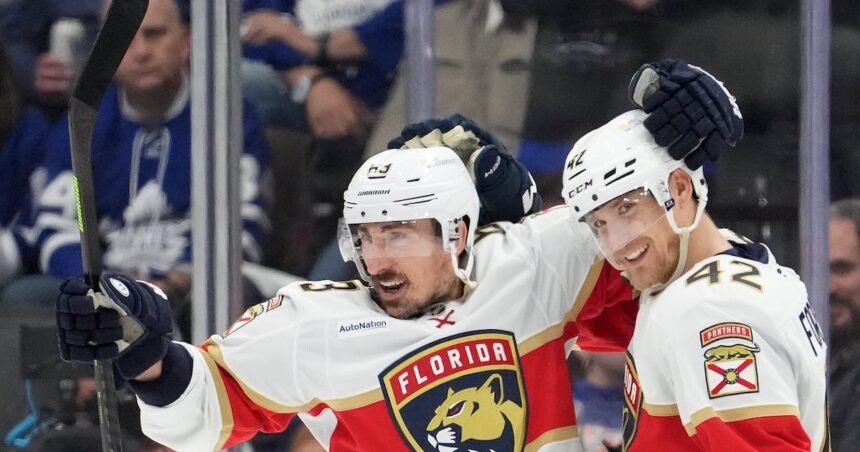Maple Leafs’ Game 7 Dreams Shattered: The Anatomy of Another Playoff Collapse
The air in Toronto grew heavy Saturday night—not with anticipation, but with the familiar weight of disappointment. In what has become a painful tradition for one of hockey’s most devoted fanbases, the Toronto Maple Leafs fell to the Florida Panthers in a decisive Game 7, crushed under the weight of a 6-1 demolition that sent the Panthers to the Eastern Conference Final.
This wasn’t just another loss. For Leafs Nation, it was the continuation of a narrative that has plagued the franchise for decades—a cycle of promise followed by playoff heartbreak that has become almost ritualistic in its predictability.
The Panthers, last year’s Stanley Cup finalists, demonstrated what championship DNA looks like. They pounced early, with Carter Verhaeghe opening the scoring just 6:35 into the first period. What followed was a systematic dismantling that left the capacity crowd at Scotiabank Arena stunned into silence, save for the occasional chorus of boos.
“You can feel it in the building when things start going wrong for the Leafs in these elimination games,” notes veteran hockey analyst Martin Reid. “There’s this collective holding of breath, this tension that seems to transfer from the stands to the ice. The players feel it too—it’s psychological at this point.”
By the time Sam Reinhart made it 3-0 before the first period ended, the ghosts of playoffs past were visibly haunting the Leafs bench. The Panthers added two more in the second period, effectively ending any hope of a miraculous comeback before the final twenty minutes even began.
What makes this loss particularly bitter for Toronto fans is the context. The Maple Leafs haven’t reached the Eastern Conference Final since 2002. The Stanley Cup drought extends back to 1967—the longest active drought in the NHL. Each playoff exit reopens these wounds, each Game 7 collapse adds another layer to the franchise’s complicated relationship with postseason success.
Toronto’s core of Auston Matthews, Mitch Marner, William Nylander, and John Tavares—a group that has consistently delivered brilliant regular season performances—once again found themselves unable to translate that excellence when it mattered most. Matthews, who scored 69 goals in the regular season, managed just two in the seven-game series against Florida.
“At some point, you have to question whether this group has what it takes mentally,” said former NHL coach Claude Julien on a post-game panel. “Talent isn’t the issue—Toronto has plenty of that. But championship teams have something else, an intangible quality that allows them to rise to the occasion rather than shrink from it.”
The Panthers, meanwhile, displayed exactly that quality. Their aggressive forechecking, disciplined defensive structure, and opportunistic offense showcased a team built for playoff hockey. Sergei Bobrovsky was stellar in net, stopping 23 of 24 shots and frustrating Toronto’s shooters throughout the series.
For Leafs management, difficult questions loom. Does this core get another chance? Should head coach Sheldon Keefe pay the price for another playoff disappointment? The emotional investment of Toronto fans demands answers, but solutions to the team’s playoff struggles have proven elusive for decades.
The psychological toll of these repeated failures extends beyond the ice and into the fabric of the city itself. Toronto’s relationship with its hockey team is complex—a mix of undying loyalty and perpetual heartbreak that has become part of the cultural identity of Leafs fans.
As the Panthers move on to face the New York Rangers in the Eastern Conference Final, Toronto begins another long summer of soul-searching. The images from Saturday night will linger—crestfallen players, devastated fans, and the singing of “Auld Lang Syne” that eerily fits a franchise forever saying goodbye to championship hopes.
Will next year be different? It’s the question Leafs fans have been asking for generations. The answers, like the Stanley Cup itself, remain frustratingly out of reach.
For more analysis on trending topics in sports, visit CO24 Trends. To explore the cultural impact of sports on Canadian identity, check out CO24 Culture. For more opinion pieces on the state of hockey in Canada, visit CO24 Opinions.










